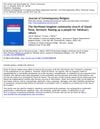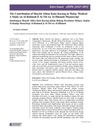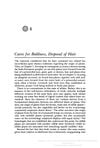 9 citations,
September 2009 in “The Prostate”
9 citations,
September 2009 in “The Prostate” Finasteride doesn't improve survival in LNCaP tumor model during off-cycle of therapy.
 7 citations,
March 2020 in “Lasers in Medical Science”
7 citations,
March 2020 in “Lasers in Medical Science” LLLT is a safe, promising hair loss treatment, but more research needed.
 7 citations,
January 2001 in “PharmacoEconomics”
7 citations,
January 2001 in “PharmacoEconomics” The article concludes that a balance is needed between individual healthcare needs and societal resources when it comes to lifestyle drugs, with a call for compassionate policy application.
 6 citations,
November 2020 in “Dermatology and Therapy”
6 citations,
November 2020 in “Dermatology and Therapy” The free clinic successfully provided specialized skin care to uninsured patients.
 6 citations,
March 2014 in “Herba Polonica”
6 citations,
March 2014 in “Herba Polonica” Plant extracts may help treat hormone-related hair loss.
 6 citations,
May 1997 in “Journal of Contemporary Religion”
6 citations,
May 1997 in “Journal of Contemporary Religion” The church aimed to prepare for Yahshua's return by living a New Testament lifestyle and focusing on children's roles.
 3 citations,
March 2016 in “Phytotherapy Research”
3 citations,
March 2016 in “Phytotherapy Research” The new compound was more effective than finasteride in reducing markers of hair loss and prostate issues in cell tests.
 3 citations,
June 2004 in “Alternative and Complementary Therapies”
3 citations,
June 2004 in “Alternative and Complementary Therapies” The document concludes that hair loss is influenced by genetics and other factors, and while treatments like finasteride can help, they have limitations and side effects.
 1 citations,
December 2022 in “Research Square (Research Square)”
1 citations,
December 2022 in “Research Square (Research Square)” Certain health conditions and hair care habits affect the treatment results for a scalp condition called Central Centrifugal Cicatricial Alopecia.
 1 citations,
October 2015 in “CRC Press eBooks”
1 citations,
October 2015 in “CRC Press eBooks” Nutricosmetics with active ingredients can help with hair loss and improve hair growth.
 March 2024 in “Journal of Pharmaceutical and Sciences”
March 2024 in “Journal of Pharmaceutical and Sciences” Zaleya pentandra extracts, especially acetone, may be useful for new medicines and food industry applications.
 December 2023 in “International Journal of Science and Research (IJSR)”
December 2023 in “International Journal of Science and Research (IJSR)” Herbal treatments are effective and preferred for hair loss with fewer side effects.
 May 2023 in “Jurnal Sains Insani”
May 2023 in “Jurnal Sains Insani” Shaykh Abbas Kuta Karang significantly advanced Malay medical knowledge with his detailed manuscript.
 May 2023 in “Archives of dermatological research”
May 2023 in “Archives of dermatological research” Some factors like thyroid disease, diabetes treatment, hair dryers, natural hairstyles, and scalp conditions can affect the treatment results for a hair loss condition called CCCA.

Custom skincare can be made based on genes, fewer cats in Lublin have FeLV/FIV than national average, and studies also looked at small water bodies, river pollution, guppy growth, toxins in biochars, palm oil issues, and pumpkin seed oil for hair strength.
 May 2022 in “Pharmacognosy journal”
May 2022 in “Pharmacognosy journal” Moringa seed oil may help prevent hair loss and promote hair growth.
 December 2018 in “Meandros medical and dental journal”
December 2018 in “Meandros medical and dental journal” A man developed a rare late-onset hair-pulling disorder, usually seen in younger people.
 January 2015 in “Hair therapy & transplantation”
January 2015 in “Hair therapy & transplantation” Some botanical products may help increase hair growth in people with alopecia, but more research is needed.
 February 2014 in “Harvard University Press eBooks”
February 2014 in “Harvard University Press eBooks” The document describes how hair and plants are symbolically linked in Indo-European traditions, leading to practices like burying hair to promote plant growth and using plants to treat baldness.
 79 citations,
January 2018 in “Wiley Interdisciplinary Reviews-Developmental Biology”
79 citations,
January 2018 in “Wiley Interdisciplinary Reviews-Developmental Biology” Understanding how baby skin heals without scars could help develop treatments for adults to heal wounds without leaving scars.
33 citations,
June 1995 in “International journal of legal medicine” Environmental factors can greatly reduce drug levels in hair.
9 citations,
January 2014 in “Molecular Genetics and Metabolism Reports” The rhg mutation in mice affects the Oat gene, causing hair growth issues and other symptoms.
36 citations,
July 2017 in “Journal of controlled release” A new method allows for controlled, long-lasting delivery of retinoic acid through the skin with fewer side effects.
15 citations,
August 2020 in “Analytical chemistry” Hair lipids do not protect against humidity.
 15 citations,
January 2020 in “Experimental Dermatology”
15 citations,
January 2020 in “Experimental Dermatology” The document concludes that understanding and treatments for alopecia areata have significantly advanced, now recognizing it as an autoimmune disorder.
 8 citations,
January 2023 in “Biosensors”
8 citations,
January 2023 in “Biosensors” Piezoelectric Nanogenerators are promising for non-invasive health monitoring but need efficiency and durability improvements.
 7 citations,
February 2023 in “Inflammation and Regeneration”
7 citations,
February 2023 in “Inflammation and Regeneration” The protein interleukin-1 alpha helps regenerate hair follicles and increase stem cell growth in mice.
5 citations,
February 2022 in “Biophysical journal” The model shows that filament flexibility and amino acid differences affect how fast intermediate filament proteins assemble.
4 citations,
March 2022 in “Pharmaceutics” Regenerative cellular therapies show promise for treating non-scarring hair loss but need more research.
2 citations,
February 2021 in “Case reports in dermatological medicine” The new topical botanical formulation significantly regrew hair in all five patients without side effects.






















